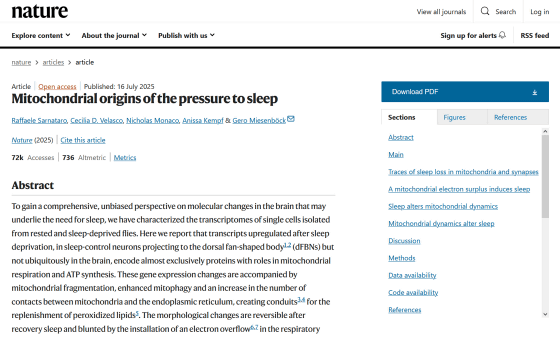Research results suggest that drowsiness may be caused by mitochondrial overload

Many of us have experienced the drowsiness that can't be helped, especially in class or at work. Researchers at Oxford University have discovered that the underlying cause of this sleepiness may be an overload of
Mitochondrial origins of the pressure to sleep | Nature
https://www.nature.com/articles/s41586-025-09261-y

Why do we need sleep? Oxford researchers find the answer may lie in mitochondria | University of Oxford
https://www.ox.ac.uk/news/2025-07-18-why-do-we-need-sleep-oxford-researchers-find-answer-may-lie-mitochondria
Sleepiness Could Be Triggered by a Power Overload in Our Brain : ScienceAlert
https://www.sciencealert.com/sleepiness-could-be-triggered-by-a-power-overload-in-our-brain
The research team analyzed neurons that regulate sleep using fruit flies , which have sufficient biological similarity to humans. They compared fruit flies that got enough sleep with those that were sleep-deprived, examining differences in gene activity and electrical signaling.
'We set out to understand the purpose of sleep and why we feel the need to sleep in the first place,' said study co-author Gero Miesenbeck , professor of physiology at the University of Oxford. 'Despite decades of research, no one had identified a clear physical trigger.'
The research revealed that mitochondria, which are responsible for aerobic respiration and produce adenosine triphosphate (ATP) , a form of energy for the body, from oxygen and nutrients, are involved in the process of sleepiness.

In the brains of sleep-deprived fruit flies, mitochondria in the neurons that regulate sleep become overloaded, releasing electrons and producing harmful compounds called
When the research team genetically altered flies to increase electron production in the neurons that regulate sleep, they found that they also slept longer. Conversely, flies genetically altered to decrease electron production slept less.
'The answer to this question seems to lie in the very mechanism by which cells convert oxygen into energy,' said Raffaele Sarnataro , a neuroscientist and lead author of the paper.

'Sleep is also related to factors other than mitochondria, such as how many cups of coffee you drink per day and how your circadian rhythm is regulated. However, these new insights into sleep may be useful for treating sleep disorders and neurodegenerative diseases such as Alzheimer's.'
Related Posts:
in Science, Posted by log1h_ik







